Geology with Physical Geography
UCAS code F6F8
- Study mode
- Full-time
- Duration
- 3 years
- Start date and application deadlines
-
- Start date
UCAS code F6F8
The Earth surface system is dynamic and diverse, with changes driven by the interplay of physical, chemical, geological and biological processes in a wide range of environments. Drawing on the complementary expertise of staff in geology and physical geography, this integrated degree programme provides a clear view of the controlling processes that link landscape evolution with environmental change and natural events that impact human activity.
You’ll be taught by research active staff, at the forefront of their chosen fields, learning about cutting-edge science before it appears in textbooks. You’ll also have the opportunity to undertake project work within the Department’s research groups.
Your training will include the comprehensive study of surface and near-surface processes, relevant to many industrial, engineering and environmental employment sectors. Years one and two cover a wide range of geological and physical geography topics, allowing for greater choice in the final year.
Fieldwork in years two and three at Liverpool is designed specifically for this degree programme integrating geology and geomorphology were you will have academic tutors from both disciplines.
A research-based dissertation is undertaken in year three on a geological and/or geomorphological topic.
A residential field course, designed exclusively for Geology with Physical Geography students, integrates all aspects of the degree.
A number of the School’s degree programmes involve laboratory and field work. Fieldwork is carried out in various locations, ranging from inner city to coastal and mountainous environments. We consider applications from prospective disabled students on the same basis as all other students, and reasonable adjustments will be considered to address barriers to access.
This degree is accredited by the Geological Society of London, satisfying the requirements of Fellowship and Chartered Geologist status.

We’re proud to announce we’ve been awarded a Gold rating for educational excellence.
Discover what you'll learn, what you'll study, and how you'll be taught and assessed.
In year one, you will take seven compulsory modules and one optional module as outlined below.
Fieldwork involves residential field class and field days (UK based).
ENVS117 is required for students without A2 Maths or Physics or equivalent from a Foundation year. You must discuss this with your Programme Director at the start of the academic session.
| Optional modules | Credits |
|---|---|
| EARTH STRUCTURE AND PLATE TECTONICS (ENVS112) | 15 |
| LIVING WITH ENVIRONMENTAL CHANGE (ENVS119) | 15 |
| ESSENTIAL MATHS (ENVS117) | 15 |
Programme details and modules listed are illustrative only and subject to change.
In year two, you will take the following compulsory modules and two optional modules as outlined below.
Fieldwork involves a residential field class and field days (UK based).
Programme details and modules listed are illustrative only and subject to change.
In year three, students take the following compulsory modules, and five optional modules as outlined below.
Fieldwork involves:
ENVS300 is a research project that can take place in the field, laboratory or a combination. If students choose a geological field mapping project, data in the field will take place in Summer between Years 2 and 3. If students choose a laboratory project, data can be collected in the summer between Years 2 and 3 and during Semester 1 of year 3. Report write up will take place in Semester 1 and 2.
| Compulsory modules | Credits |
|---|---|
| FLUVIAL ENVIRONMENTS (ENVS372) | 15 |
| GEODYNAMICS OF THE MEDITERRANEAN (ENVS368) | 15 |
| EARTH SCIENCE PROJECT (ENVS300) | 30 |
Programme details and modules listed are illustrative only and subject to change.
Teaching takes place through lectures, practicals, workshops, seminars, tutorials and fieldwork, with an emphasis on learning through doing. The award-winning Central Teaching Laboratories, provide a state-of-the-art facility for undergraduate practical work. Students value the learning opportunities provided by field classes, including the rapid and detailed feedback on performance.
You will typically receive 15-20 hours of formal teaching each week, and complete multiple residential fieldtrips over the course of their programme. In years three and four you will carry out independent research projects on a topic and location of your choice. All projects are supervised by a member of staff who will meet with you on a weekly, or more frequent, basis.
Our excellent staff to student ratio means you will never be an anonymous student in an enormous class and you’ll have the opportunity to get to know all staff in the Department. You will have fortnightly tutorials with a member of academic staff in years one and two, and you will be assigned a personal tutor, who can offer guidance and support throughout your time at the University.
Assessment matches the learning objectives for each module and may take the form of written exams, practical laboratory and computer examinations, coursework submissions in the form of essays, scientific papers, briefing notes or lab/field notebooks, reports and portfolios, oral and poster presentations and contributions to group projects, and problem-solving exercises. Assessment is via tasks that mirror those graduate students are likely to undertake working as professional geoscientists. For example, generating and interpreting quantitative spatial data, with appropriate consideration of inherent uncertainty, is a key task and necessary skill for professional environmental geoscientists, and this skill is developed and assessed on several programme modules, especially field and lab-based modules. As well as being authentic in terms of the underlying purpose of the assessed task, assessment tasks are also authentic in terms of format, intended audience, resources used, and collaborative team elements. For example, team-based environmental assessment work with professional format delivery appropriate for presentation to management-level colleagues using state-of-the-art field, lab or IT resources is central to assessments in field classes.
We have a distinctive approach to education, the Liverpool Curriculum Framework, which focuses on research-connected teaching, active learning, and authentic assessment to ensure our students graduate as digitally fluent and confident global citizens.
The Liverpool Curriculum framework sets out our distinctive approach to education. Our teaching staff support our students to develop academic knowledge, skills, and understanding alongside our graduate attributes:
Our curriculum is characterised by the three Liverpool Hallmarks:
All this is underpinned by our core value of inclusivity and commitment to providing a curriculum that is accessible to all students.
The qualifications and exam results you'll need to apply for this course.
| Qualification | Details |
|---|---|
| A levels |
BBC (including ) |
| BTEC Level 3 national extended diploma |
DDM. Forensic Science is not accepted. |
| BTEC combinations |
BTEC National Diploma DM plus a science subject at A level grade B; BTEC National Extended Certificate M plus a science subject at A level grade B another A level grade B. |
| Welsh Baccalaureate Advanced |
C in the Welsh Baccalaureate, plus BB at A level including a science subject at grade B |
| Access |
Pass relevant Access to HE Diploma with 45 Level 3 credits with 27 at Distinction and 18 at Merit |
Studying with us means you can tailor your degree to suit you. Here's what is available on this course.
University of Liverpool students can choose from an exciting range of study placements at partner universities worldwide. Choose to spend a year at XJTLU in China or a year or semester at an institution of your choice.
Immerse yourself in Chinese culture on an optional additional year at Xi'an Jiaotong Liverpool University in stunning Suzhou.
Broaden your world by spending an additional year of study at a partner university abroad following your second year of study.
Take a semester of your second year of study at one of our worldwide partner institutions.
Spend a summer abroad on a study placement or research project at one of our worldwide partner institutions.
Year in industry placements give you an in-depth workplace experience where you can develop your skills and apply your learning.
You don't need to decide now - you can choose to add a year in industry after you've begun your degree.
To spend a year in industry, you'll need to secure a placement with an organisation. If you're unable to find a placement, you'll continue with the standard version of the course without a year in industry.
Every student at The University of Liverpool can study a language as part of, or alongside their degree. You can choose:
At Liverpool, we place a great deal of emphasis on learning through experience. You will be taught in Europe’s most advanced teaching laboratories and will participate in a strong fieldwork programme that will help to prepare you for solving real work problems. You will have access to excellent resources, including research-level analytical equipment and computing facilities, and will be trained in industry-standard methods using materials donated by companies. All our degree programmes will provide you with specific scientific training, as well as equipping you with a wide range of transferable skills valued by employers. You will graduate as a practical, confident and employable earth scientist.
We have a very active Earth Sciences student society – The Herdman society. The society runs academic and social events from guest lectures and field trips to gala dinners, symposiums and sports events.
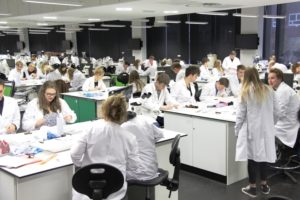
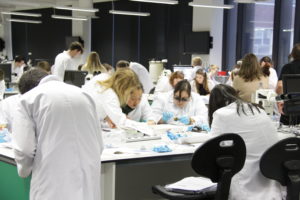
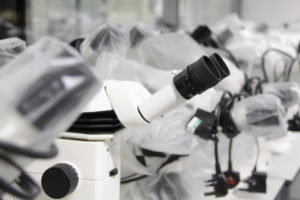
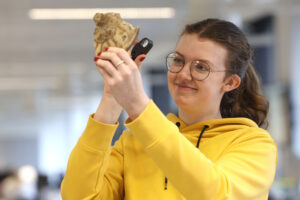
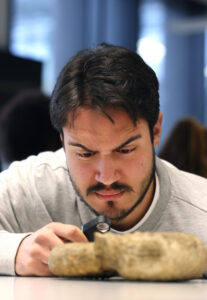

Discover what you’ll study, the facilities and resources you’ll have access to, and how we’ll prepare you for your future career.
From arrival to alumni, we’re with you all the way:

Want to find out more about student life?
Chat with our student ambassadors and ask any questions you have.
There has never been a better time to study Earth sciences. Many of the fundamental questions of our times will be answered by geoscientists, as we seek to provide sustainable resources for the world’s population, as well as predict and mitigate climate change and natural hazards by building a better understanding of the planet on which we live.
Our recent graduates have gained employment within a degree-related field or continued within further education after graduation. We have close links with geoscience and environmental industries ensuring that our degrees properly equip you for future employment.
89.5% of environmental sciences students are in work and/or further study 15 months after graduation.
(Discover Uni, 2018-19.)
Your tuition fees, funding your studies, and other costs to consider.
Full-time place, per year - £9,535
Year in industry fee - £1,905
Year abroad fee - £1,430 (applies to year in China)
Full-time place, per year - £29,100
Year in industry fee - £1,905
Year abroad fee - £14,550 (applies to year in China)
The tuition fees shown are correct for 2025/26 entry. Please note that the year abroad fee also applies to the year in China.
Tuition fees cover the cost of your teaching and assessment, operating facilities such as libraries, IT equipment, and access to academic and personal support. Learn more about paying for your studies.
We understand that budgeting for your time at university is important, and we want to make sure you understand any course-related costs that are not covered by your tuition fee. This could include expenses such as field clothing and sustenance (food and drinks) during fieldwork.
Find out more about the additional study costs that may apply to this course.
We offer a range of scholarships and bursaries that could help pay your tuition and living expenses.
If you’re a UK student joining an undergraduate degree and have a household income below £35,000, you could be eligible for a Liverpool Bursary worth up to £2,000 for each year of undergraduate study.
Apply for an Asylum Seekers Scholarship and you could have your tuition fees paid in full and receive help with study costs. You’ll need to have applied for asylum in the UK, or be the dependant of an asylum seeker, and be joining an eligible undergraduate degree.
If you’ve spent 13 or more weeks in Local Authority care since age 14, you could be eligible for a bursary of £3,000 per year of study. You’ll need to be a UK student joining an eligible undergraduate degree and be aged 28 or above on 1 September in the year you start.
Are you a UK student with a Black African or Caribbean heritage and a household income of £25,000 or less? You could be eligible to apply for a Cowrie Foundation Scholarship worth up to £8,000 for each year of undergraduate study.
If you’re a UK student identified as estranged by Student Finance England (or the equivalent UK funding body), you could be eligible for a bursary of £1,000 for each year of undergraduate study.
Joining a School of Biosciences degree and have a household income of less than £25,000? If you’re a UK student, you could apply to receive £4,500 per year for three years of your undergraduate course.
Do you live in the Liverpool City Region with a household income of £25,000 or less? Did neither of your parents attend University? You could be eligible to apply for a Nolan Scholarship worth £5,000 per year for three years of undergraduate study.
Are you a UK student with a household income of £25,000 or less? If you’ve participated in an eligible outreach programme, you could be eligible to apply for a Rigby Enterprise Award worth £5,000 per year for three years of your undergraduate degree.
Are you a UK student with a household income of £25,000 or less? Did neither of your parents attend University? You could be eligible to apply for a ROLABOTIC Scholarship worth £4,500 for each year of your undergraduate degree.
Apply to receive tailored training support to enhance your sporting performance. Our athlete support package includes a range of benefits, from bespoke strength and conditioning training to physiotherapy sessions and one-to-one nutritional advice.
Joining a degree in the School of Electrical Engineering, Electronics and Computer Science? If you’re a UK student with household income below £25,000, you could be eligible to apply for £5,000 a year for three years of study. Two awards will be available per academic year.
If you’re a young adult and a registered carer in the UK, you might be eligible for a £1,000 bursary for each year of study. You’ll need to be aged 18-25 on 1 September in the year you start your undergraduate degree.
Use our handy chatbot for your Clearing enquiries.
Last updated 17 June 2025 / / Programme terms and conditions